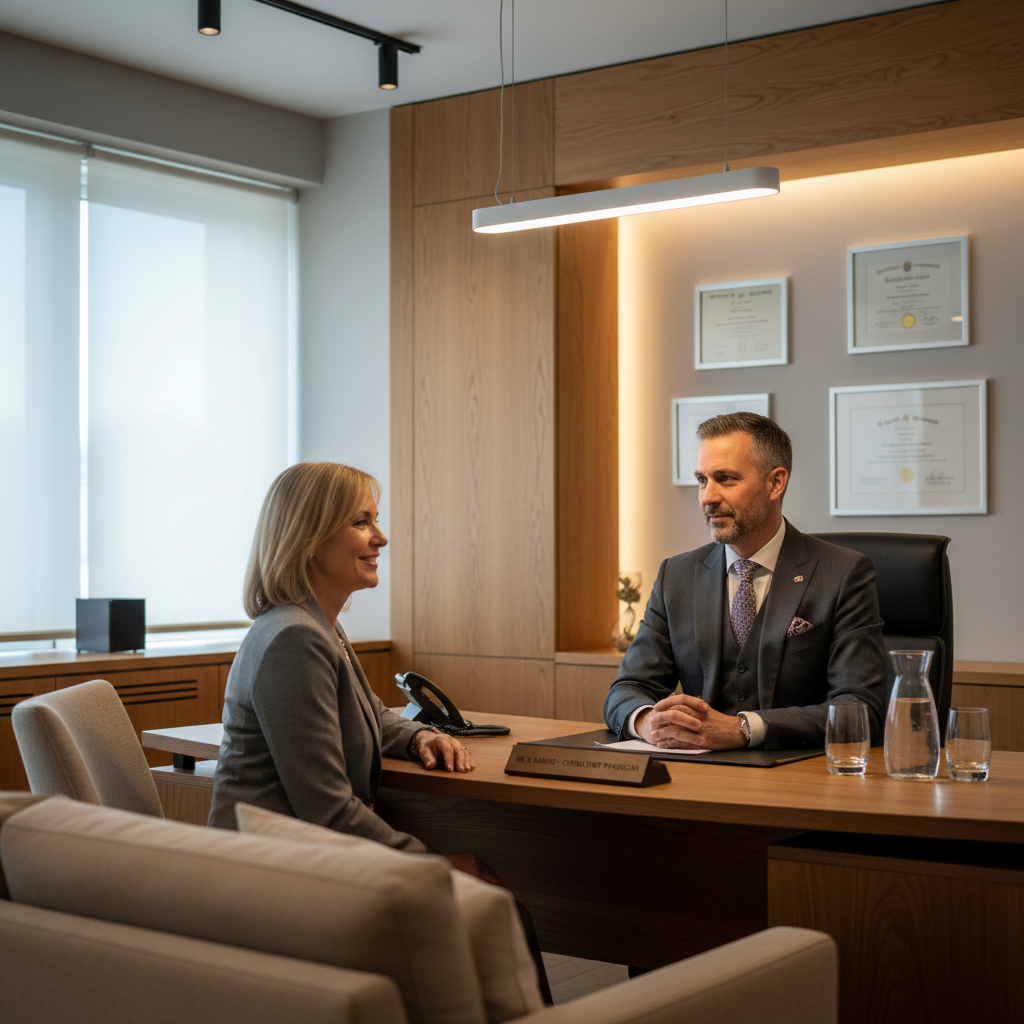Two Harley Street consultants. Same medical school. Similar specialisations. Identical credentials. Five years later, one has a nine-month waiting list and growing private practice revenue. The other struggles to retain patients beyond initial consultations.
Clinical competence isn't the variable.
The Problem: When Medical Excellence Isn't Enough
Private healthcare operates on a different equation than NHS medicine. Clinical credentials provide entry. Patient confidence determines success. And patient confidence - particularly in high-value private practice - responds to factors beyond medical qualifications.
The consultation room reveals this immediately. Patients research consultants extensively before booking. They've verified qualifications, read peer reviews, checked success rates. By the time they arrive, they know you're clinically competent. The consultation answers a different question: "Do I trust this person with my health?"
That trust formation happens in seconds. Before you review their case history. Before you explain treatment options. Before clinical excellence becomes visible.
The Status Quo: Clinical Focus Without Patient Psychology
Most medical professionals approach private practice as an extension of clinical work. Master the medicine. Maintain certifications. Publish research. The patients will come.
This works - until it doesn't. Initial referrals arrive through medical networks. Some patients return. But practice growth stalls. Referral generation remains inconsistent. High-value procedures go to competitors with similar credentials.
The traditional medical response: improve clinical outcomes, invest in better equipment, expand specialisations. All valuable. None addressing the actual constraint: patient confidence formation.
Meanwhile, consultants who understand patient psychology - whether consciously or intuitively - build thriving practices. Same credentials. Different growth trajectories.
The Implications: Practice Growth Permanently Constrained
The business consequences affect every aspect of private practice development. Patient acquisition costs remain high when initial consultations don't convert to ongoing relationships. Referral generation stays limited when patients don't feel confident recommending your services. Premium procedure opportunities go to competitors who inspire greater patient trust.
Revenue volatility becomes chronic. Good months depend on chance referrals rather than systematic patient confidence building. Practice expansion plans stall without predictable revenue growth. Investment in advanced capabilities - new procedures, better facilities - doesn't generate expected returns because patient flow remains constrained.
Your clinical team senses the gap. Excellent medical professionals watching patients choose competitors for non-clinical reasons. High-value procedures going elsewhere despite superior outcomes. The frustration of knowing you're better clinically while losing commercially.
The Considerations: Patient Confidence Beyond Medical Credentials
Consider the Manchester cosmetic surgery consultant expanding into high-net-worth clientele. Medical credentials were impeccable - Royal College fellow, published researcher, excellent outcomes. But affluent patients considering £20,000+ procedures chose London competitors.
The issue wasn't surgical skill. It was the confidence patients felt when considering life-changing medical decisions. Executive presence in medical settings carries weight beyond clinical discussions. Patients subconsciously assess capability through presentation long before understanding technical expertise.
Or the Edinburgh cardiovascular consultant attracting international patients. Clinical reputation was solid, but international patients - particularly from Middle Eastern and Asian markets - expected presentation standards matching £30,000+ procedure investments.
The solution wasn't changing medical approach. It was ensuring presentation matched clinical excellence, allowing patient confidence to form naturally around demonstrated expertise.
The Value and Return: Accelerated Practice Growth
When presentation supports clinical excellence, patient confidence forms immediately. Initial consultations convert to ongoing relationships at higher rates. Patients recommend your services confidently to their networks. High-value procedures - where patient discretion and confidence matter most - come to you rather than competitors.
The financial implications are substantial. Private practice revenue depends heavily on patient retention and referral generation. Each percentage point improvement in conversion rates compounds through patient networks. Premium procedures typically generate 3-5x the revenue of standard consultations - and go almost exclusively to consultants inspiring highest patient confidence.
Practice expansion becomes feasible. Predictable patient flow supports investment in advanced capabilities. Satellite consultation locations make sense when confident patient relationships transfer geographically. International patient programs develop naturally when presentation matches global private healthcare standards.
Perhaps most valuable: practice development stops feeling like chance and starts feeling systematic. You control the factors influencing patient confidence. Growth becomes predictable rather than opportunistic. Your clinical excellence finally generates the commercial results it deserves.
The Cost of Inaction: Practice Potential Permanently Unrealised
The alternative constrains everything. Practice growth remains dependent on chance referrals and luck. Premium procedures go to competitors with better patient confidence generation. International patient opportunities - where presentation expectations are highest - remain permanently out of reach.
Revenue volatility continues indefinitely. Good months followed by quiet periods. Difficulty planning practice investments when revenue remains unpredictable. The constant stress of never knowing whether patient flow will sustain operations.
Talented medical professionals leave for better-managed practices. High-value referral sources - other consultants, affluent patient networks - direct patients elsewhere. Your clinical reputation remains strong in medical circles while commercial performance lags.
Most painfully: watching less-qualified competitors build thriving practices because they understood patient psychology while you focused purely on clinical excellence. The knowledge that you're better medically while losing commercially.
Moving Forward: Patient Confidence Through Professional Presence
Private practice success requires both clinical excellence and patient confidence generation. Not manipulative psychology. Not marketing spin. But ensuring your presentation matches your expertise, allowing patient trust to form naturally.
Schedule a bespoke tailoring consultation to discuss how mobile bespoke tailoring supports private practice growth. From Harley Street to Edinburgh, Manchester to international patient programs- we understand the balance between medical professionalism and patient confidence building.
Your clinical credentials are excellent. Your patients should feel that confidence from the first moment.








